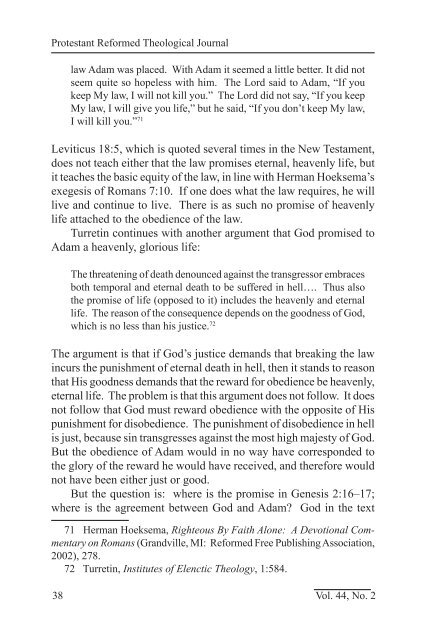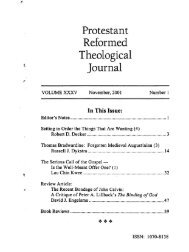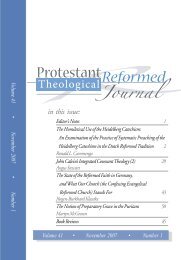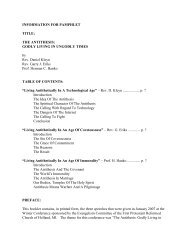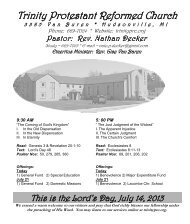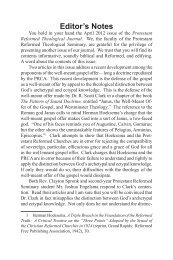A Critique of the Covenant of Works in Contemporary Controversy
A Critique of the Covenant of Works in Contemporary Controversy
A Critique of the Covenant of Works in Contemporary Controversy
Create successful ePaper yourself
Turn your PDF publications into a flip-book with our unique Google optimized e-Paper software.
Protestant Reformed Theological Journal<br />
law Adam was placed. With Adam it seemed a little better. It did not<br />
seem quite so hopeless with him. The Lord said to Adam, “If you<br />
keep My law, I will not kill you.” The Lord did not say, “If you keep<br />
My law, I will give you life,” but he said, “If you don’t keep My law,<br />
I will kill you.” 71<br />
Leviticus 18:5, which is quoted several times <strong>in</strong> <strong>the</strong> New Testament,<br />
does not teach ei<strong>the</strong>r that <strong>the</strong> law promises eternal, heavenly life, but<br />
it teaches <strong>the</strong> basic equity <strong>of</strong> <strong>the</strong> law, <strong>in</strong> l<strong>in</strong>e with Herman Hoeksema’s<br />
exegesis <strong>of</strong> Romans 7:10. If one does what <strong>the</strong> law requires, he will<br />
live and cont<strong>in</strong>ue to live. There is as such no promise <strong>of</strong> heavenly<br />
life attached to <strong>the</strong> obedience <strong>of</strong> <strong>the</strong> law.<br />
Turret<strong>in</strong> cont<strong>in</strong>ues with ano<strong>the</strong>r argument that God promised to<br />
Adam a heavenly, glorious life:<br />
The threaten<strong>in</strong>g <strong>of</strong> death denounced aga<strong>in</strong>st <strong>the</strong> transgressor embraces<br />
both temporal and eternal death to be suffered <strong>in</strong> hell…. Thus also<br />
<strong>the</strong> promise <strong>of</strong> life (opposed to it) <strong>in</strong>cludes <strong>the</strong> heavenly and eternal<br />
life. The reason <strong>of</strong> <strong>the</strong> consequence depends on <strong>the</strong> goodness <strong>of</strong> God,<br />
which is no less than his justice. 72<br />
The argument is that if God’s justice demands that break<strong>in</strong>g <strong>the</strong> law<br />
<strong>in</strong>curs <strong>the</strong> punishment <strong>of</strong> eternal death <strong>in</strong> hell, <strong>the</strong>n it stands to reason<br />
that His goodness demands that <strong>the</strong> reward for obedience be heavenly,<br />
eternal life. The problem is that this argument does not follow. It does<br />
not follow that God must reward obedience with <strong>the</strong> opposite <strong>of</strong> His<br />
punishment for disobedience. The punishment <strong>of</strong> disobedience <strong>in</strong> hell<br />
is just, because s<strong>in</strong> transgresses aga<strong>in</strong>st <strong>the</strong> most high majesty <strong>of</strong> God.<br />
But <strong>the</strong> obedience <strong>of</strong> Adam would <strong>in</strong> no way have corresponded to<br />
<strong>the</strong> glory <strong>of</strong> <strong>the</strong> reward he would have received, and <strong>the</strong>refore would<br />
not have been ei<strong>the</strong>r just or good.<br />
But <strong>the</strong> question is: where is <strong>the</strong> promise <strong>in</strong> Genesis 2:16–17;<br />
where is <strong>the</strong> agreement between God and Adam? God <strong>in</strong> <strong>the</strong> text<br />
71 Herman Hoeksema, Righteous By Faith Alone: A Devotional Commentary<br />
on Romans (Grandville, MI: Reformed Free Publish<strong>in</strong>g Association,<br />
2002), 278.<br />
72 Turret<strong>in</strong>, Institutes <strong>of</strong> Elenctic Theology, 1:584.<br />
38<br />
Vol. 44, No. 2


